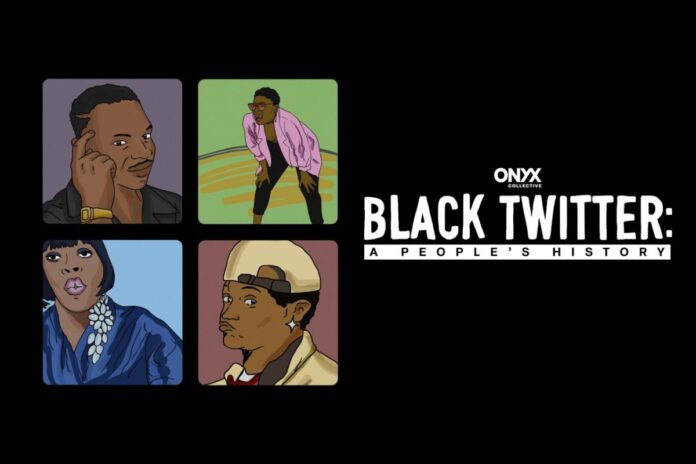Black Twitter: A People’s History is a three-part docuseries, directed by Prentice Penny and streaming on Hulu, about, well, Black Twitter. The series is based on Jason Parham’s Wired cover story “A People’s History of Black Twitter,” and it examines just how Black culture so effectively coalesced on the social media platform, and where it might be going now that Elon Musk has bought the platform and turned it into X.
Opening Shot: We see scenes of interviewees talk to director Prentice Penny about where they need to look, or if there’s lotion around, or if a microphone is on.
The Gist: One of the reasons why Penny wanted to document Black Twitter, and why Parham wrote his Wired series, because they wanted to document it before it irrevocably changed. And, as Penny cites in its narration, with Musk buying Twitter during the making of the docuseries, that change is definitely underway.
Penny talks to a long roster of pop culture figures, journalists, Twitter celebrities and even company employees about just what made Twitter a place where Black culture and shared history found a strong voice. Of course, along the way these experts talk about memes and threads that were significant — and often very funny — touchpoints.
In addition, we see a roundtable of people who created famous hashtags and memes, as a way of discussing how, when hashtags were created and users were allowed to post GIFs and other visual responses, Black Twitter was on the forefront of that style of expression.

What Shows Will It Remind You Of? Black Twitter: A People’s History is similar to pop-culture docuseries like the decade-based ones that have been on CNN for a number of years.
Our Take: Our description of Black Twitter: A People’s History doesn’t do justice to how entertaining the series actually is, mainly because we’re coming at it from an outside perspective. No, we weren’t so ignorant about Black Twitter to be one of those white people who would ask if it was at a different URL from “regular” Twitter, as we see in some of the interviews and news footage. But any experience we had with the discourse was as an observer, not a participator.
The docuseries does a good job of explaining just how the advent of social media helped younger members of the Black community talk and joke about things without having to explain anything to anyone, and do it at scale. That’s the part of the documentary we found to be the most interesting; the steps that led up to Black Twitter, from BlackVoices to NetNoir to a nascent version of Black Twitter developing on MySpace.
Penny does a good job of communicating that the whole idea of social media subcultures, something that is so common these days, really didn’t exist before Black Twitter, and because the shared experience and community that was fostered among the service’s Black users was so strong, it was in a lot of ways the template for the other “XXX Twitter” subcultures that ended up developing in the early days of the service.
The first episode keeps it light, but it will lead into the shared experience of stories like the deaths of Trayvon Martin, George Floyd and others. What we’re also interested in hearing about is exactly how the Black experience on Twitter has evolved and just what is to become of that experience now that Musk seems to be systematically picking apart everything that made the service a place where cultural shared experiences can thrive.
Sex and Skin: There’s some talk about the “after dark” subset of Black Twitter, but that’s about it.
Parting Shot: As we see scenes from everything from Black Lives Matter rallies to January 6, Jemele Hill mentions that stories like that “Black Twitter was going to be way bigger than just fun and jokes.”
Sleeper Star: We really enjoyed Kalin Elisa telling the story of how the picture of her, wearing a pink jacket, stooped over and wincing, actually happened, and how that became one of Black Twitter’s biggest memes.
Most Pilot-y Line: None we could find.
Our Call: STREAM IT. Black Twitter: A People’s History is a fun and informative document of a phenomenon that is endemic to this particular era of social media discourse, but also helped change the discourse that was happening in general culture.
Joel Keller (@joelkeller) writes about food, entertainment, parenting and tech, but he doesn’t kid himself: he’s a TV junkie. His writing has appeared in the New York Times, Slate, Salon, RollingStone.com, VanityFair.com, Fast Company and elsewhere.



